Contents
- Is THIS The Final Betrayal of Workplace Trust?
- The Return-to-Office Reset
- Red Flags and RTO
- The New Rules of Workplace Loyalty
- #1: Pay: Your Pay Should Rise By 10-20% Every Year
- #2: Promotion: Your Career Should Level-Up Every 1-2 Years
- #3: Progress: Your Skills Must Improve at Work Every Year
- The Crossover Advantage
- Making Job Loyalty Work for You
Job loyalty is wildly overrated. They sell it as dedication to your work – as a virtue that makes you a more likable and EMPLOYABLE human being. But for most jobs, it’s just the slow death of your potential. Here are the new rules of workplace loyalty.
Does your company deserve you?
Seems like a strange question – until you realize something fundamental: for most tech workers what you put into your job, is infinitely more than what you’re getting out.
And it SHOULDN’T be that way.
Workplaces everywhere are FAILING their tech workers. And the recent RTO wave has been the final nail in the coffin.
I’m calling it: RIP job loyalty, 2024.
At this point in your remote career, it’s important to understand the dynamics of workplace loyalty and how they could dismantle your progress!
According to SHRM, one survey said that 82% of workers feel loyalty towards their employers. They’re super committed and dedicated to their job – which results in higher retention rates and a certain willingness to do MORE than is asked of them.
Great, right?
But if things were so peachy more people would stay put in their roles.
- Between 2012 and 2022 the average job tenure was 4.1 years
- This is the lowest it has EVER been
- And top performers change jobs even faster (2 or so years on average)
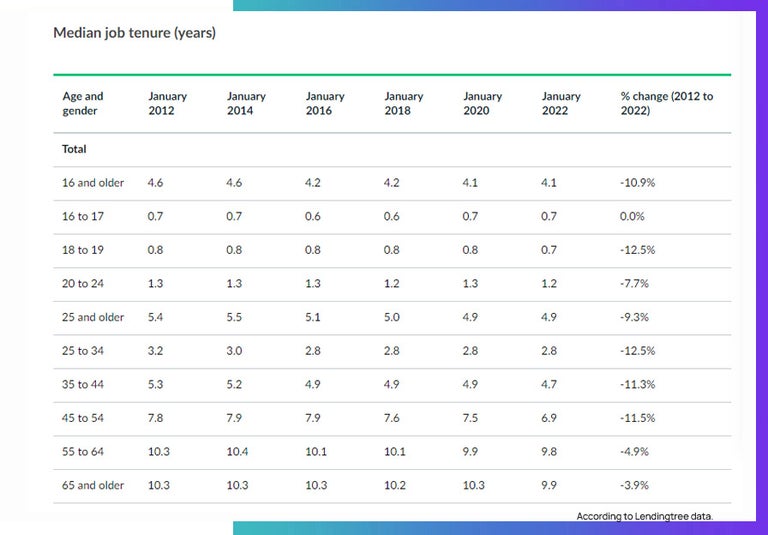
This year’s State of the Workplace Report by Gallup, shone some blinding light on the worsening one-sided relationships happening in tech right now – and they’re BLEAK.
- Mental health decline is at a 10-year high
- Globally, 77% of workers are not engaged or are actively disengaged at work
- 66% of global workers are struggling or suffering in life
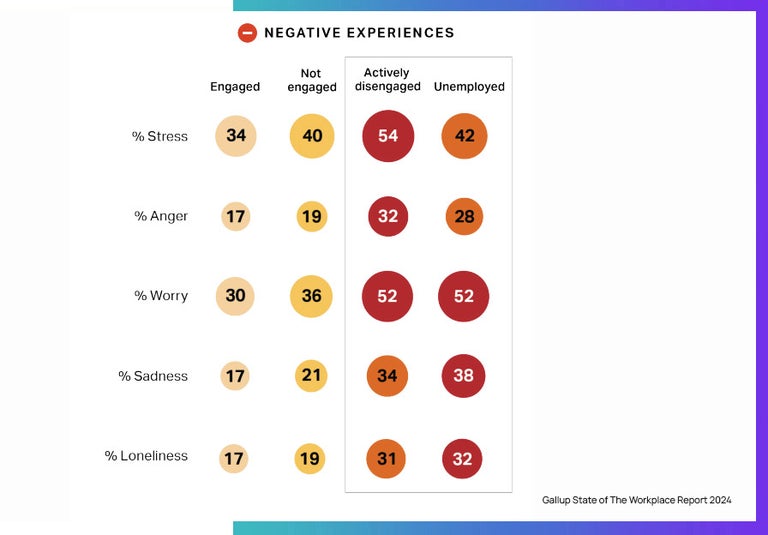
And I see (some) of it as a failure to recognize the shift in priorities for tech companies and for your own career growth.
There are good reasons why more than half of workers are looking for a new job.
Workplace loyalty died because it’s no longer mutual - today, loyalty flows up while benefits drip down, leaving workers burnt out and ready to move on.
This article is your flashing neon sign to LEAVE dead-beat employers and rewrite the rules of workplace loyalty. You’ll learn how to spot the red flags, prioritize your growth, and put your career first - because loyalty means nothing if it’s not mutual.
Is THIS The Final Betrayal of Workplace Trust?
Recently, some friends of mine were laid off from a well-known local tech company. These were hard-working, above-and-beyond types who were not expecting to be treated with such savage expendability.
They gave YEARS of their lives to this company.

Unpaid overtime. Weekends. Pushing toward metric goals and being subjected to brutal internal reviews – all in the name of the bottom line.
And perhaps most brutally = they saw no real benefit from that sacrifice, only to end up in the ‘expendable’ out-tray along with the quiet quitters.
This is not an uncommon story these days.
Lay-offs are rife because of AI. Then there are the RTO games.
The Return-to-Office Reset
Your bosses told you remote work was working. They praised your productivity and promised flexibility - until they didn’t. Now, with zero evidence to back their claims, they’re dragging you back to the office.
Proving that for companies extinguishing the light of remote work - loyalty only works one way in 2024.

There’s no denying the recent surge of return-to-office (RTO) mandates has been jarring for everyone. But it’s hit loyal, hard workers hardest.
CEOs swore that the office would elevate productivity, collaboration, and innovation. But the studies have debunked those claims.
- Productivity: Studies show that adding office days doesn’t do anything to boost performance. In fact, workers often get less done when juggling commutes, in-person meeting overload and ongoing office distractions.
- Collaboration: Forced face time doesn’t magically fix communication gaps -tools like Slack and Zoom have already proven their worth. If anything, it’s AI-driven tools making collaboration easier for remote teams.
- Innovation: Studies reveal that remote work encourages deep focus, leading to breakthrough ideas. The office, on the other hand, is just a breeding ground for the loudest voices in the room.
And as we saw earlier, people are NOT happy.
Is this a direct result of worsening work-life balance cultures?
The office isn’t where the magic happens anymore, and dragging workers back under false pretenses has been the ULTIMATE betrayal of loyalty.
At best, RTO is a desperate power play by companies stuck in the past, prioritizing control and real estate ROI over trust and results. At worst, it’s trimming the fat by forcing a high percentage of the workforce to leave for greener pastures.
Quiet firing is diabolical.
It’s a way for companies to avoid paying full retrenchment packages to their employees. It’s a ruthless money-saving tactic that happens at your expense.
And it’s reset the rules of workplace loyalty.
Red Flags and RTO
RTO mandates aren’t the first red flags we’ve seen over the years, as the narrative has changed and become more about control than anything else.
- “We’re a family here” – which meant expect to work yourself to near-death with late-nights, weekends and holidays (real family never clocks out!).
- “Unlimited PTO” – which meant sure, take time off at your own risk, but no one actually uses it without bombastic side-eye from your manager.

Job loyalty was always supposed to be a two-way street.
You’re expected to give your best to your company – and they reward you for it. In the form of growth, recognition and trust.
That’s why RTO is such a major red flag. It’s like being in a relationship with someone who says, ‘you’ve changed’ after you’ve tried to improve yourself – then forces a break-up by insisting you go back to who you were 5 years ago.
RTO goes beyond betrayal – it’s actively harming good people.
It's a Trust Betrayal
During the pandemic your company proved remote work is fantastic.
You hit goals, met deadlines, and moved to your dream house in a less expensive area. Heck, you adopted 3 sweetheart golden retrievers from the local shelter! Now they’re walking back that trust with no valid reason, leaving your choices in shambles and your dogs with separation anxiety.
It's Anti-DEI and Anti-Progress
The biggest losers in the RTO push are women, minorities, and caregivers.
These are the folks who NEED flexible work to get ahead. Companies mandating RTO are undoing YEARS of progress in diversity, equity, and inclusion. And they’re not taking any responsibility for the fact that it’s unnecessarily spiteful.
It's a Career Killer
Do you know who benefits with you at the office more often? Your company.
You’re more likely to develop bonds with your coworkers and as a result – sacrifice your time, energy and freedom on the altar of in-person teamwork. It’s easier to leave a job that isn’t right for you if you’re not so attached to the people there.
While the people behave as smoke-and-mirrors, you remain stagnant in your role.
The New Rules of Workplace Loyalty
Is it a coincidence that the reasons top performers quit early are the exact red flags to watch for when searching for a mutually beneficial job?
Job loyalty isn’t what it once was.

It’s not about sticking with a company that doesn’t deserve you and hoping for the best. Most companies show you exactly how much they care about you within months of hiring you.
There are new rules you need to follow.
It’s about aligning with organizations that prioritize your growth and respect your autonomy. If your job doesn’t deliver on these three pillars, it’s time to rethink your commitment.
I don’t know who needs to hear this, but:
#1: Pay: Your Pay Should Rise By 10-20% Every Year
Things move fast in tech – and pay does too.
The main work contract, stripped down to its bare bones is – you provide a service, and you’re fairly compensated for it.
- Your take-home pay MUST cover your needs and give you the quality of life you’re after. Ideally that means saving, investing AND having money to live. Otherwise, the days of your life are on sale and you’re going cheap.
- There’s a reason why top performers switch jobs every 2 years. They’re paid more (up to 20%) when they do. It’s a way of guaranteeing progress and preventing career stagnancy. If you’re waiting for 6% increases that don’t even beat inflation – you’re wasting your time and skills. Pay must increase, and your wealth must rise.
Rule 1: Loyalty doesn’t pay the bills – money does. You must EARN enough to live and pay must increase FAIRLY over time to support your RISING skill level.
#2: Promotion: Your Career Should Level-Up Every 1-2 Years
Why do more if you’re being crushed under a ceiling?
Perhaps the most essential element of a healthy workplace is upward mobility. Having a clear promotion path with substantial benefits is a massive (and non-negotiable) motivator.
If you’re seeing no career advancement, no progress and no shot at something bigger – leave.

As long as you’re there you’re doing a job, not growing your career.
Jobs earn money, but careers create wealth. Your main job is to create enough value at work to progress to the next level. If that’s not always top-of-mind for you, you’re being too complacent.
Rule 2: Loyalty means less than nothing with no path forward. You must always see a CLEAR route to promotion, career advancement and BETTER opportunities to excel.
#3: Progress: Your Skills Must Improve at Work Every Year
You need PAID time learning new skills that apply in your job.
If your job is not willing to help you learn, with new hands-on work, certifications or paid time to invest in upskilling or reskilling, it’s actively holding you back.
This is the age of constant learning, where skipping even 1 month leaves you in a chronic state of catch-up.
Look for mentors, programs and learning opportunities to harness and seize all of them with delight. THIS is a perk. Not ping-pong tables and water slides into the canteen where you can top up on free bran muffins.
Tragically, quite a few tech companies expect their workers to upskill on their own time. In my opinion, to learn effectively it needs to be concurrent and run alongside your work.
Rule 3: Your job should help you GROW places. You must be allowed to learn during your work time, to test new skills, to engage with mentors and gain new knowledge at work.
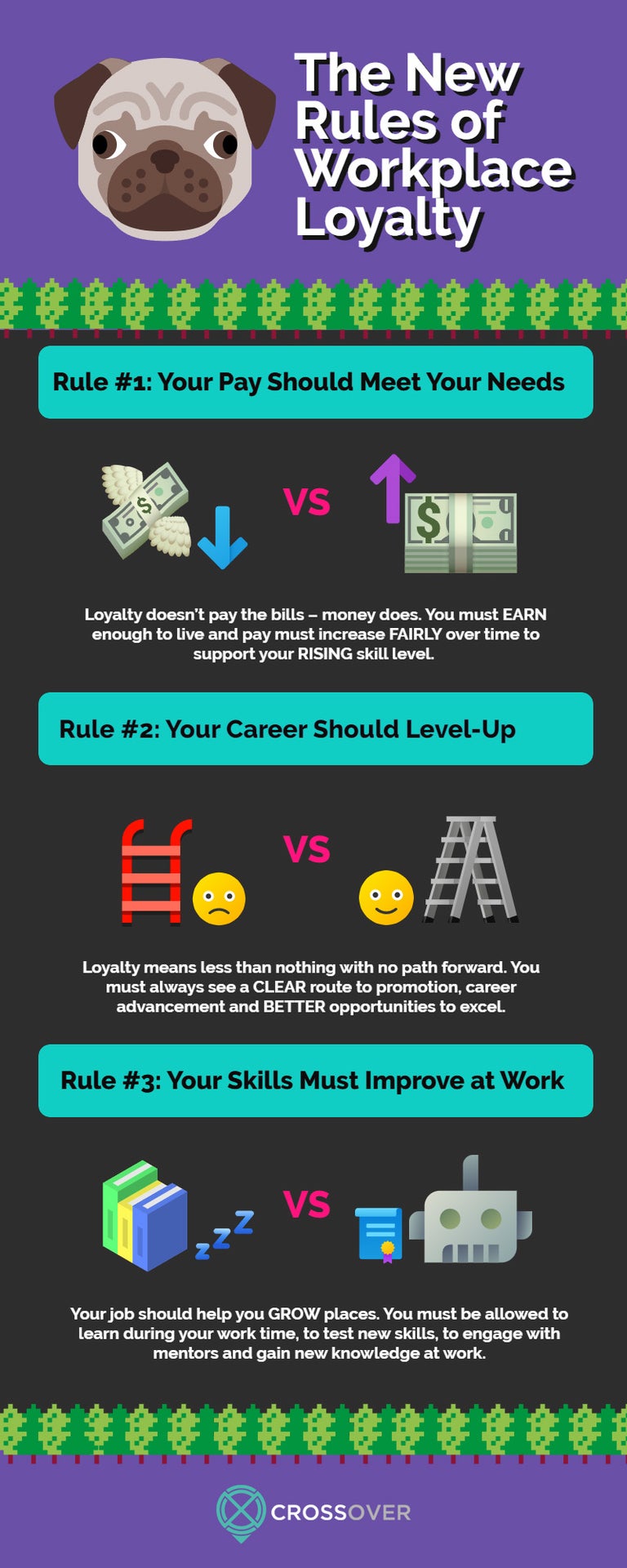
These are workplace loyalty dealbreakers. Like any relationship, if these are broken by your company – you must leave for your own sake. Otherwise, you’re donating the limited time you have in your career to a company that doesn’t care about you.
Care at work literally = PAY. PROMOTION. PROGRESS.
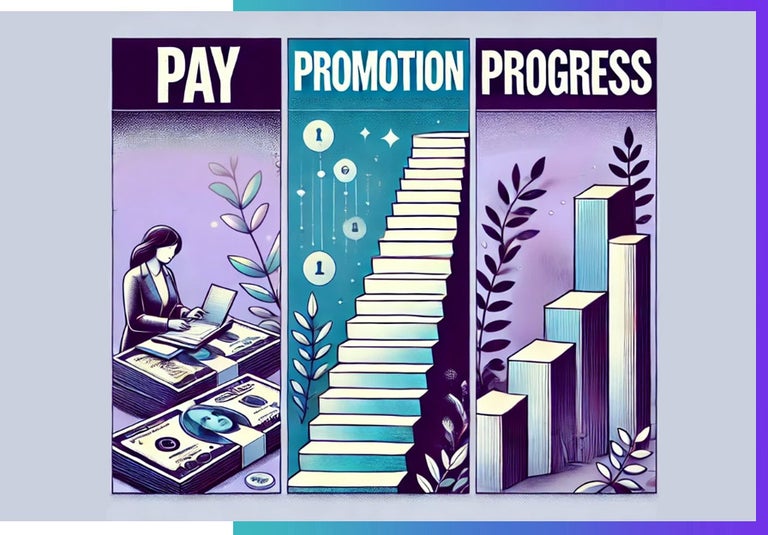
The Crossover Advantage
For years, I struggled to find a company where all three of these essential pillars were clearly defined and valued.
A lot of companies talk the talk, but they have no legs for walking. These were rules I couldn’t break, so I kept looking until I found Crossover.
- On Crossover, your pay is DOUBLED with every promotion
- If you create real results... a promotion is inevitable!
- You are encouraged and equipped to learn every day (tools, reports, second brains, tests, mentors)
If you can move mountains to get things done, you will never have to worry about having enough time, money or career movement.
Not only is that fair, its highly motivating – because it’s based on what you PUT IN. You can take periods of rest and accelerate for periods of growth.
As an optimized meritocratic system this means everyone here has an equal chance at getting as far as they want to go. It’s on your ability and performance level.
This results-based culture is linked to pay success on such a scale that it is – in my humble opinion – the fastest, BEST way to keep people happy and innovating.
Who doesn’t want to learn daily, get promoted then earn double their pay? We see people we work with all the time get promoted, and achieve new career heights.
Figure out how, and the sky is the limit.
In our latest Out of Office Raghul Suthagar speaks about his recent promotion to SVP. And past hires like Diego Ortiz realized the fallacy of workplace loyalty and switched to Crossover (now he can afford to travel and really live his life).
Making Job Loyalty Work for You
Job loyalty isn’t a virtue - it’s a choice. And in 2025, it can be a ruinous one.
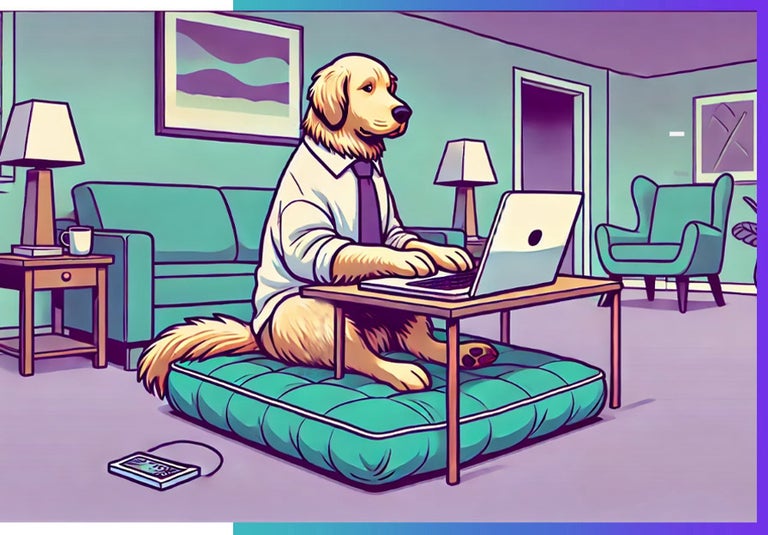
The only loyalty that matters is to your own growth, freedom, and potential. Stop sacrificing for companies that don’t invest in you and don’t care about you.
Real care is calculable. It comes in the form of pay, promotion and progress.
Rewrite the rules, demand a fair exchange for your talent, and build a career where loyalty is mutually beneficial – not one sided.
The world is set to change in 2025 and you can be a part of it.
So, I’m going to ask you again –
Does your company deserve you?









